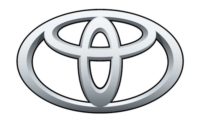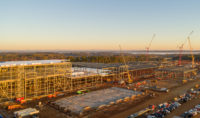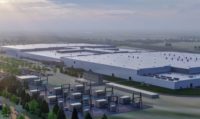LG Chem will spend $3.2 billion beginning early next year to build a cathode manufacturing plant in Clarksville, Tenn., which the South Korea-based global manufacturer of chemicals, petrochemicals and advanced materials calls key to meeting its plan to build a $15-billion battery material business to meet global demand for electric vehicles.
The plant will be the largest of its type in the U.S. with a production target of 120,000 tons of cathode material a year by 2027, which would power 1.2 million electric vehicle batteries, each with a range of 310 miles.
LG Chem’s anticipated spend would also be the single largest announced foreign direct investment in Tennessee history, state officials said.
The company said it sees Tennessee as being the supply chain hub where material and recycling partners work to supply global customers. “The new cathode manufacturing facility in Tennessee brings us one step closer to becoming the world’s best battery materials manufacturer and fulfilling our corporate vision to become a top global science company,” CEO Shin Hak-Cheol said in a statement.
The plant will produce advanced NCMA cathode materials—those containing nickel, cobalt, manganese and aluminum—the critical ingredients for determining capacity and duration of next-generation EV batteries, the company said.
The Tennessee plant will contain LG Chem’s most advanced production technology, will be fully automated and will rely completely on renewable energy from solar and hydroelectric sources for its operation. The facility will be built in Tennessee Valley Authority's service area, which is the region’s top battery and EV producer, a company spokesman said.
Construction is set to begin in the first quarter 2023, LG Chem said, with production planned for the second half of 2025.
“The facility will be designed with the environment and future needs of clean energy in mind," the company said, but it would not release names of design or construction firms involved in the project or confirm the status of contract procurement.
Since 2017, companies have invested $12.7 billion in Tennessee through EV-related projects, the state said.
Southern Battery Hub Grows
Meanwhile, South Korea battery maker LG Energy Solutions and joint venture partner Hyundai Motor Co. are considering building two battery plants in the U.S., a Korean news media outlet said Nov. 28, according to Reuters.
The plants would be built in Georgia near Hyundai’s new EV plant and large enough to power 1 million electric vehicles. The facilities would help Hyundai meet new U.S. EV subsidy rules—which, beginning next year, will require at least 40% of critical components for batteries be made in the U.S. or in a U.S. free-trade partner to qualify for U.S. tax credits, with EVs required to be assembled in North America.
Neither Hyundai or LG Energy Solutions responded to a request for comment.
To meet U.S. tax credit requirements, LG Energy on Nov. 10 signed a multi-year agreement with Compass Minerals to supply battery-grade lithium carbonate from its Ogden, Utah solar evaporation lithium brine plant. Compass Minerals agreed to deliver 40% of its phase-one battery grade lithium carbonate production to LG for an initial siz-year term. The brine unit is expected to come online in 2025.
LG in September also signed agreements with three Canadian companies to supply lithium and cobalt for its battery materials supply chain in North America.
“The Inflation Reduction Act “underscores the importance of EV battery components manufactured or assembled in North America” and the significance of battery manufacturers establishing local supply chains there, LG said in a statement.
Hyundai also could build a third U.S. battery plant, with plans to team with SK On, the battery unit of SK Innovations, and site an estimated $1.1-billion facility in Georgia, according to Reuters
The two companies signed an agreement Nov. 28 to source electric vehicle batteries in North America and produce batteries for Hyundai after 2025. Further details will be released later, the companies said.
Hyundai said through the agreement, it will “bolster its EV presence in the North American market and accelerate its battery electric vehicle sales.”






Post a comment to this article
Report Abusive Comment